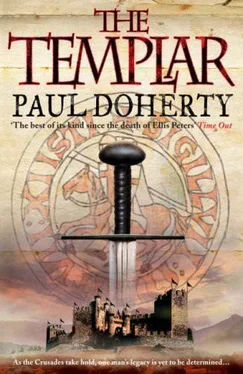P. Doherty - The Templar
Здесь есть возможность читать онлайн «P. Doherty - The Templar» весь текст электронной книги совершенно бесплатно (целиком полную версию без сокращений). В некоторых случаях можно слушать аудио, скачать через торрент в формате fb2 и присутствует краткое содержание. Год выпуска: 2010, ISBN: 2010, Издательство: Minotaur Books, Жанр: Исторические приключения, на английском языке. Описание произведения, (предисловие) а так же отзывы посетителей доступны на портале библиотеки ЛибКат.
- Название:The Templar
- Автор:
- Издательство:Minotaur Books
- Жанр:
- Год:2010
- ISBN:9780312576837
- Рейтинг книги:5 / 5. Голосов: 1
-
Избранное:Добавить в избранное
- Отзывы:
-
Ваша оценка:
- 100
- 1
- 2
- 3
- 4
- 5
The Templar: краткое содержание, описание и аннотация
Предлагаем к чтению аннотацию, описание, краткое содержание или предисловие (зависит от того, что написал сам автор книги «The Templar»). Если вы не нашли необходимую информацию о книге — напишите в комментариях, мы постараемся отыскать её.
The Templar — читать онлайн бесплатно полную книгу (весь текст) целиком
Ниже представлен текст книги, разбитый по страницам. Система сохранения места последней прочитанной страницы, позволяет с удобством читать онлайн бесплатно книгу «The Templar», без необходимости каждый раз заново искать на чём Вы остановились. Поставьте закладку, и сможете в любой момент перейти на страницу, на которой закончили чтение.
Интервал:
Закладка:
For a week the siege became a desultory affair of two enemies watching each other like circling dogs, then, abruptly, the atmosphere changed. Count Raymond bustled about accompanied by Tacticius the Greek commander. Ballistae and mangonels from the arsenals of Constantinople appeared in the camp. These were wheeled down to the Leaning Tower to launch a scathing attack of missiles and rocks that drove the defenders from the walls. A new breach was opened, and when darkness fell, the night was illuminated by roaring fires and the light of flaming missiles hurled at the tower. This time the Turks had no opportunity to repair the damage. The star-lit sky was streaked with orange tongues, the silence shattered by the whoosh of missiles, the crash of wood and stones and the cries of both defenders and attackers. As soon as daylight broke, the Poor Brethren of the Temple, to shouts of ‘ Deus vult! ’ and ‘Toulouse!’, prepared to lead Count Raymond’s force across the makeshift bridge over the moat. Hugh and Godefroi kissed Eleanor before tightening the chain-mail bands across their faces, which left only their eyes exposed. Helmets were strapped on, shields fastened to arms and swords drawn.
Hugh and Godefroi led their company down to the bridge whilst archers, crossbowmen and engineers loosed volley after volley at the walls. The catapults edged even closer to intensify the barrage. Eleanor watched, heart in mouth, as Hugh and Godefroi crossed the rickety bridge. Smoke billowed about, screams and shouts echoed. The knights of Toulouse thronged all about her. Standards were unfurled, men-at-arms in full battle gear waited to reinforce the first assault on those formidable defences. The horror and din of battle whipped Eleanor’s senses as if some wandering demon had seized her soul, her mind, her imagination. She looked up at the empty blue sky bending over those soaring yellow-brick fortifications. Arrows, sling shots and other missiles scored the blue. Oaken bundles, smoking evilly, swept through the air, spouts of flame erupted from the battlements. Eleanor glanced again. Hugh and Godefroi, shields up, were halfway across the bridge when an earsplitting roar cut through the noise of war. Men were pointing at the battlements where scarlet and gold banners displaying the gorgeous eagle of Alexius Comnenus were being draped and hoisted. The city had fallen! Greek forces were inside. The Turks had surrendered! Trumpets called the retreat. Hugh and his company fell back even as more imperial banners fluttered from the ramparts above them. A loud screech cut the air. The great gates of Nicea swung open and Catephracti, blue-silver insignia fluttering from their spear points, came thundering out. Imogene cursed and immediately left, searching for Beltran. Eleanor, feeling weak, eager to escape the confusing storm of war, returned to her tent. She went to lie down on the ready-made palliasse but startled in horror at the two curved daggers, white bone-handles gleaming, pushed deep into the bolster, their blades tied together by a ribbon of blood-red cord…
‘Know ye,’ a voice whispered behind her, ‘what you possess shall escape you and, in the end, return to us.’
Eleanor turned slowly. At first she could see nothing, then she made out a shadow outlined by the slit in the tent through which the mysterious intruder must have entered. He sat cross-legged on the ground, garbed in a white robe, head and face swathed in a black turban exposing only the eyes.
‘The witch woman’s chart.’ The voice stumbled over the Norman French. ‘I know Fulcher gave it to you.’ He extended a gloved hand; the other tapped the hilt of the dagger in the red waistband.
Eleanor tried to speak but couldn’t.
‘The chart!’ the man insisted.
‘My brother,’ Eleanor stammered. The sounds from outside grew stronger, followed by shouts of someone approaching the tent. Eleanor glanced at the main flap then back, but her mysterious visitor had vanished.
Simeon the scribe, talking as ever — God had given him a tongue as nimble as his pen — burst into the tent gabbling the news. How the Emperor had brought ships in ox-drawn carts to the Askanian lake and sent them up against Nicea. How these ships had even captured the wife and family of the Governor of Nicea as they tried to escape. The Turks soon realised that if the Army of God manned those ships, their city would certainly fall and be devastated by fire and sword. They had immediately entered into secret negotiations with Alexius, promising to surrender to him if they and their possessions were spared from the Army of God. Alexius had agreed, sending a high-ranking envoy named Boutoumites into the city to accept the surrender. The leaders of the Army of God had had some inkling of this, but when the news became public, the Franks immediately accused Alexius of duplicity and treachery.
Rumours were rife that Boutoumites had encouraged Tacticius to persuade Count Raymond to attack, writing a note: ‘We have the game in our hand, assault the walls. Do not let the Franks know the true situation but, after sunrise, let them attack the city.’ The leaders of the Army of God knew about the ships and the pressure these would place on the Turks, but they never expected such a swift surrender. The Emperor had kept them in the dark and by nightfall his deceit was common talk around the camp. Tempers rose, especially amongst the Normans from southern Italy led by Bohemond and Tancred, so Alexius moved quickly to mollify them. Cartloads of fresh provisions and wine, baskets, coffers and chests full of precious stones, gold and silver, stacks of weapons, piles of embroidered cloths and lines of sleek, plump horses were dispatched into the camp. The Poor Brethren of the Temple drew their share, ten gold bezants, which went into the common coffer under Godefroi’s care. Later that same night, Eleanor, Hugh, Godefroi, Alberic, Norbert, Theodore and Simeon gathered to meet. The scribe had been taken on to their council because of his clerical skills as well as his knowledge of the shrines of Jerusalem, particularly the Dome of the Rock. Theodore hosted the meeting, welcoming their new recruit, and pointing out that Simeon’s only protection against the rancour of the camp was Hugh and Eleanor, so it was little wonder the scribe had enthusiastically taken their secret oath. On that night, as all the gates of Nicea were opened and the heralds proclaimed how the Army of God would soon march for Antioch, Eleanor told them about her own mysterious visitor.
‘But who could it be?’ Alberic asked. ‘Every one of the Poor Brethren was mustering before the Leaning Tower.’
‘It must be someone in the Army of God,’ Eleanor insisted. ‘The same thing happened in Constantinople.’
‘The Fedawi,’ Theodore explained. ‘Perhaps their assassins lurk hidden amongst us? It is foolish to speculate, but at least we know the importance of Anstritha’s map. Lord Hugh, you have it safe, yes?’
‘Yes,’ Hugh replied absent-mindedly. ‘You have all seen it, but come…’
They turned to fresh news. Bohemond’s phalanx was to leave immediately the following morning. Count Raymond wanted the Poor Brethren of the Temple to join these and act as a link with the rest of the army. No one disagreed, eager for what Hugh called the ‘proper pilgrimage’ to begin in earnest.
Eleanor would never forget their departure. They left Nicea just before the sun rose swiftly in sheets of red-gold flame against the light blue sky. A fitting start for what proved to be a time of wrath, of anger, the beginning of the horrors. Yet, as Eleanor wrote in her chronicle, it started ordinarily enough. She sat perched on one of the carts, Imogene squatting next to her as Bohemond’s column trudged down the old Roman road stretching to the valleys and dusty plateaus leading down to Antioch. They crossed stone bridges built by the ancients over streams and rivulets, and passed the occasional decaying Byzantine guard tower. On either side rolled wild meadows sprinkled with hardy summer flowers; now and again, long strips of ochre-tinted ploughland; here and there a solitary farmstead usually built around the shell of a ruined villa. Clumps of sycamore, holm oak, grey ash, willow and cypress broke the undulating landscape. They passed lonely villages with their dusty trackways, wandering goats, domed wells, silent vineyards and wine presses. The morning air rang with the clatter and rumble of carts, the jingle of harness, the clink of weapons, shouts and cries from the trudging men-at-arms. Dust clouds swirled, staining the black robes of the monks. Spear and lance tips caught the sunlight and flashed it brilliantly back. Faces, white, red and brown, became laced with sweaty dust. Children played or fought with each other. Hymns were chanted. A group of nobles in gorgeously coloured robes left the column escorted by their grooms clad in green and brown; hawks fluttered on their wrists, or strained against the perches, making the jesse-bells tinkle. Young men, leggings pulled up, stood in the streams, busy with string or net to catch fresh fish. Eleanor considered it was more like a day out in the country, visiting friends or enjoying the good weather, than marching to war. Scouts came galloping back: they had glimpsed Turkish patrols but nothing happened that day.
Читать дальшеИнтервал:
Закладка:
Похожие книги на «The Templar»
Представляем Вашему вниманию похожие книги на «The Templar» списком для выбора. Мы отобрали схожую по названию и смыслу литературу в надежде предоставить читателям больше вариантов отыскать новые, интересные, ещё непрочитанные произведения.
Обсуждение, отзывы о книге «The Templar» и просто собственные мнения читателей. Оставьте ваши комментарии, напишите, что Вы думаете о произведении, его смысле или главных героях. Укажите что конкретно понравилось, а что нет, и почему Вы так считаете.












